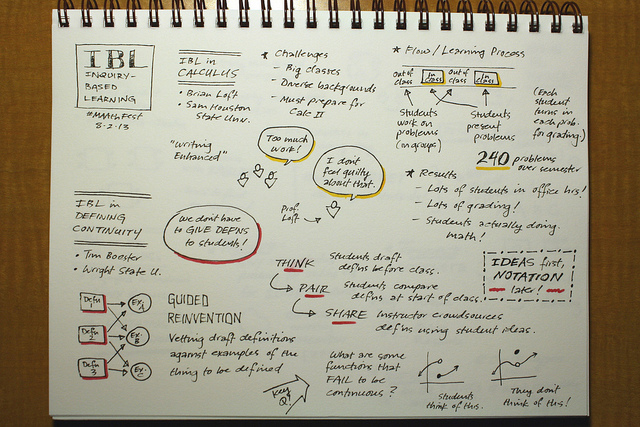 PhotoCC- By Derek Bruff
PhotoCC- By Derek Bruff
Inquiry-based learning is seeking knowledge, information, or truth through questioning. When used correctly, it triggers curiosity and encourages the students to ask questions and delve deeply into their topic of interest. Inquiry-based learning is a teaching tool that is very important, but is not always the main strategy used, however, a common inquiry-based learning strategy is know as STEM (Science, Technology, Engineering and Mathematics). Though, I think it should be use more often than what I have seen in my local area, maybe it is used more in others.
In an inquiry classroom, the teacher asks questions that are more open and reflective. These questions are especially important in the lower grades because they allow students to build a foundation for self-initiated questioning. There are four different categories of questions that are asked when inquiring; inference, interpretation, transfer, and questions about hypotheses.
Inference questions ask students to go beyond immediately available information. They ask the students to push beyond the facts and find clues, examine them, and discuss what inferences are justified. They ask students to find missing information. Interpretive questions propose that they understand the consequences of information or ideas. Transfer questions provoke a kind of breadth of thinking, asking students to take their knowledge to new places. Hypothesizing can be a way of teachers making students aware of their expectations and what inquiry-based learning is about. Here is what an inquiry-based classroom looks like:
This video truly inspires me! I hope that I can conduct learning in this way. I feel that students really take more away from this than traditional education strategies.
I feel that an inquiry based classroom would almost look chaotic with busy bodies working hard on their projects. I would be excited to see the questioning, connection making, and learning going on in my classroom and I would hope that my students would be just as excited to be engaged and working on their projects. I feel that inquiring minds are happy students. They are not bored with school and think learning is fun and intriguing. I am curious to see if a teacher could lead a solely based inquiry-based learning classroom even if it is not the school’s philosophy. I am also curious to see how much planning it take to be a successful at inquiry-based learning.
All-in-all, I hope that in my future classroom I can conduct many inquiry-based lessons. I want my students to be excited about learning. I hope that they will take their curiosity and truly learn from it. I hope that they will be able to take their experiences and reference them to later experiences. I think that inqury-based learning is an essential learning strategy that benefits students whose needs are not met by traditional instruction.
A few activities or ideas that may take place during the inquiry-based learning are:
Helpful resources:
Great post. I didn’t really understand this until I read your post. It was a great job and well organized.
LikeLiked by 1 person
Thank you. I am glad that it was written so you could understand it.
LikeLiked by 1 person
Great post! I think it’s important to be able to ask your own questions in the real world and it seems like this type of learning approach would help students do that. Plus, critical thinking is essential and inquiry based learning seem to really feed off of that!
LikeLiked by 1 person
I loved the fact that critical thinking plays a huge role in inquiry-based learning. I also am excited that it can be tied to real life application. I truly think students will be more willing to learn with this strategy.
LikeLiked by 1 person
STEM learning is a fantastic subject to go into. I encourage you to look further into this topic when thinking about your classroom and the aspects you want your students to take part in. Asking questions does a wonderful job arousing questions and allowing students to interact with one another. I loved how you broke the inquiring down into the four categories. This helped me as the reader to see the different aspects of this learning technique. When thinking about this topic, I instantly think of science class and the scientific method. What is one way you can incorporate this thought process into a different subject?
LikeLiked by 1 person
I also think mostly of science, however, I have not really ever experienced STEM. It would take a lot of planning and guidance from others, but it would be something I would like to try.
LikeLiked by 1 person
I have heard a lot about STEM from a coworker of mine. I have done lots of research on the topic and it’s something I truely find fascinating.
LikeLiked by 1 person
I too want to have inquiry-based lessons in my classroom! I like this post!
LikeLiked by 1 person
Thank you!
LikeLike
Essential questions are a handy tool to get to know to utilize. This will help the students to come up with their own answer that can be right or wrong. This can show them how to critically think and think for themselves. This is a great post and loved the video!
LikeLiked by 1 person
Thank you! I really thought that inquiry-based learning is very interesting and I thought the video was really inspiring!
LikeLike